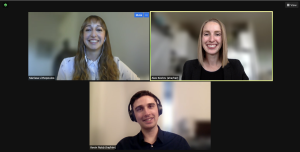Kevin Robb is a PhD candidate in Biomedical Engineering at the University of Toronto and University Health Network. His research is on the development of immunomodulatory cell-based therapies for osteoarthritis. Kevin holds a Bachelor of Science, Honours Physiology from McGill University, and a Master of Engineering Science in Biomedical Engineering from Western University. He is a member of the Stem Cell Network Trainee Communications Committee and is passionate about regenerative medicine, bioethics, and science communication.

Organizers of the ELSI Panel Discussion at TMM 2021. Clockwise from top left: Dr. Marissa Lithopoulos (Lead Organizer and TCC Vice-Chair), Alexandra Kozlov and Kevin Robb.
Scientific research does not exist in silos. The work we do as researchers is increasingly in the public eye and, in this pandemic era, there is heightened appreciation for the potential real-world impacts of our work. How can we build on this momentum and responsibly conduct impactful research that considers all stakeholders? This question motivated our team when designing the Ethical, Legal and Social Issues (ELSI) Panel Discussion at the virtual 2021 Till and McCulloch Meetings (TMM).
The ELSI Panel Discussion is an annual TMM event organized by the Stem Cell Network’s Trainee Communications Committee (TCC) that centres important ethical and policy topics in regenerative medicine. This year’s event was organized by Dr. Marissa Lithopoulos (Lead Organizer and TCC Vice-Chair), Alexandra Kozlov and me, with support from the Stem Cell Network and the TCC chaired by Dr. Joshua Dierolf.
Titled “Bioethical frameworks for greater success from the bench to the bedside,” it focused on ethical considerations within the clinical translation pipeline for cell therapies. Our vision was to cover a broad range of topics that showcase the need for bioethics discussions in all stages of research. We created a case study in which a hypothetical cell therapy for neuroinflammation was brought from preclinical testing to market. We then recruited twelve world-leading bioethicists, clinicians, scientists, veterinarians and policymakers as panelists to facilitate the case study discussions.
The case study contained three main segments and participants were assigned to Zoom break-out rooms to discuss each segment with rotating panelists. Following the case study, participants joined the main Zoom room for a debate between Dr. Zubin Master and Dr. Lithopoulos. Details on each portion of the workshop are described below:
Case Study Part One: Appropriate use of preclinical models
In Part One, participants considered the selection and use of non-human animals as disease models for evaluating preclinical efficacy of the cell therapy. Discussions were led by expert panelists Dr. Marc Avey (Canadian Council of Animal Care), Dr. David Hanwell (University of Toronto), Dr. Jonathan Kimmelman (McGill University), and Dr. Shamimunisa B. Mustafa (UT Health San Antonio). Groups discussed the importance of the Three Rs (Replacement, Reduction, and Refinement) when planning studies involving non-human animal models. Additionally, the use of severe acute disease models versus advanced chronic disease models were discussed in relation to representations of human disease states. Groups also considered how guidelines for the care of large, non-human animals differs from that of rodents, and whether protocols should be altered in studies where non-human animals are transplanted with human cells.
Case Study Part Two: Moving into clinical testing
Participants then turned their attention to considerations for testing the cell therapy in human study participants. These conversations were led by clinical trial experts Dr. James Shapiro (University of Alberta), Dr. Natasha Kekre (Ottawa Hospital Research Institute), Dr. Manoj Lalu (Ottawa Hospital Research Institute), and Dr. Hanns Lochmüller (Children’s Hospital of Eastern Ontario Research Institute). Discussions focused on evaluating preclinical data and making informed decisions to move into clinical trials. Groups conversed on responsible engagement of patient-partners to shape clinical study designs, and the importance and practicality of balancing factors such as age, race, sex and gender when recruiting study participants.
Case Study Part 3: Communicating research findings to relevant stakeholders
The final part of the case study concentrated on communicating research findings to scientists, investors and the general public. This segment was led by Prof. Amy Zarzeczny (University of Regina), Mr. Alessandro Marcon (University of Alberta), Dr. Leigh Turner (University of California, Irvine), and Dr. Master (Mayo Clinic). Participants discussed the importance of terminology for cell therapy products, and how describing ill-defined cell products as “stem cell therapies” contributes to public misinformation. Groups also examined the responsibility of researchers to communicate their findings to the public and contribute to increasing scientific literacy.
Debate: Should patients have a “right to try” cell therapies?
Following the case study discussions, participants joined the main Zoom room where they were treated to a debate between Drs. Master and Lithopoulos on the Right to Try Act. This controversial bill was passed into law in the U.S. and has been advertised as a pathway for individuals with life-threatening diseases to access therapies that have not been market-approved. The debaters were assigned to argue for or against the bill, irrespective of their personal views on the subject. Dr. Master was assigned to argue for the bill, and he presented arguments to suggest that the bill alleviates barriers and provides a complementary pathway for patients to access vital treatments. In response, Dr. Lithopoulos rebutted that the bill gives patients the false impression that accessing unproven therapies is truly their right, and that the bill removes critical safety measures for protecting patients.
If you are curious to learn more about Right to Try or haven’t yet decided whether you are for or against it, Signals covered this topic during its 2017 blog carnival. Read what our experts had to say. Next year’s TMM is expected to take place in person in Vancouver, from October 3-5, 2022. See you at the ELSI event.
Guest
Latest posts by Guest (see all)
- Regenerative immunotherapy: Hope for chronic autoimmune diseases - September 16, 2025
- Canada’s regenerative revolution: Why AI is the catalyst - September 4, 2025
- Summer by Design: A launchpad for future entrepreneurs and industry scientists - August 14, 2025






Comments